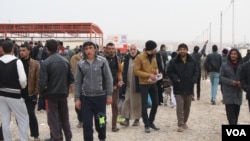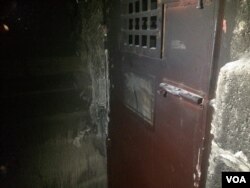Islamic State "would kill us without dignity,” says Raith Ahmed, an English teacher and a father of two. “That means throwing out bodies to the dogs.”
As he talks, Ahmed picks through debris in Hamam Alil, Iraq, from what once was a neighbor's home, now destroyed by war. In corners of this former house, closet-like cells provide evidence the property and others like it were used as prisons, with former inmates saying as many as seven people were crammed into each cell.
“On their very first day here, Daesh brought people here,” he continues, using the Arabic expression for IS, an insult to the group. “They confiscated the house.”
Iraqi soldiers were the first to be slaughtered, he adds, followed by others, like police or government workers, or anyone suspected of disagreeing with the militants. At one point, he says, he visited nearby fields - the killing place of choice - and saw hundreds of corpses.
Residents in town still seethe with rage more than a month after it was recaptured by Iraqi forces. A few blocks away, 22-year-old Ahmed Mohammed Kenan wears camouflage pants. When IS fled, he joined one of many local militias working with the Iraqi army.
“I joined for revenge,” he says. “Daesh killed seven of my brothers and my mother.”
Life in IS prison
At a refugee camp about a half-hour's drive from Mosul, where many of the residents fled, a group of men becomes animated when asked what IS prisons were like.
Almost everyone in the crowd had a story about imprisonments, whippings or other harsh punishments for activities once considered mundane.
Abdul Hakim Mustafa, a former local football player, raised pigeons - a popular hobby in Iraq - in his home before IS forced him to move to Mosul. Not long after his move, militants visited his new place in the de-facto IS capital in Iraq.
“They told me keeping pigeons as pets is forbidden,” says Mustafa. “But I hid two of the birds. They arrested me, beat me up and injured my knee.”
Mustafa said he spent four days in prison and was held in a one-meter-squared cell. Each day he was brought out of the cell, forced to sit in a chair and whipped 28 times. IS members told him he was arrested for the pigeons, and beaten because he played football.
“They said because I played football I was out of religion,” he said. His story, however, is cut off as the crowd becomes rowdier. In the crowd is one man who says he went to prison for having a carton of cigarettes he was selling by the pack to buy food. Another possessed a trinket, a traditional Middle East “evil eye” that, according to folklore, wards off jealousy.
“If they saw me like this they would whip me 50 times,” says another man, laughing as he points to his facial hair that is more stubble than beard, a forbidden style under IS. “Almost everyone in Mosul has been whipped.”







